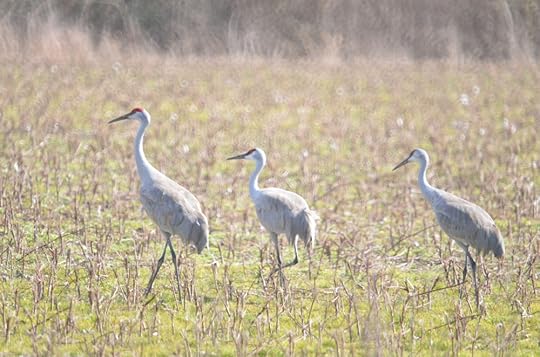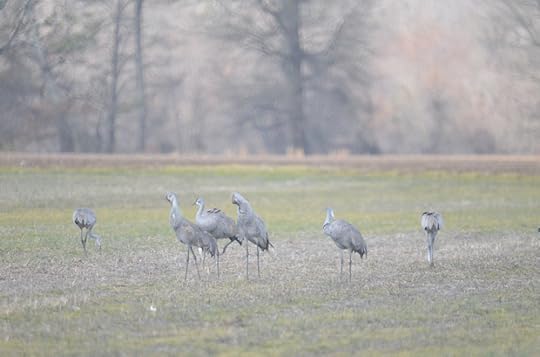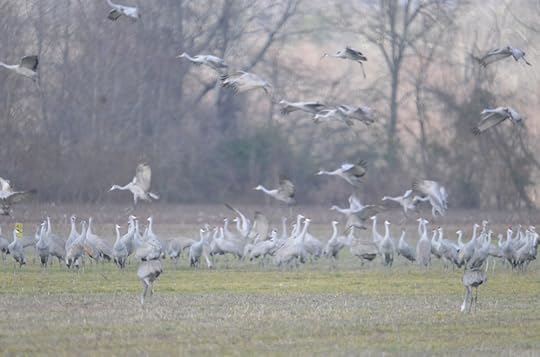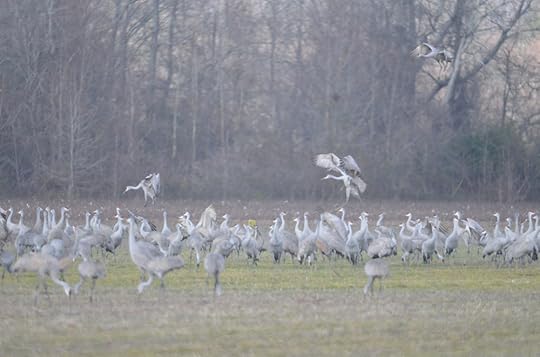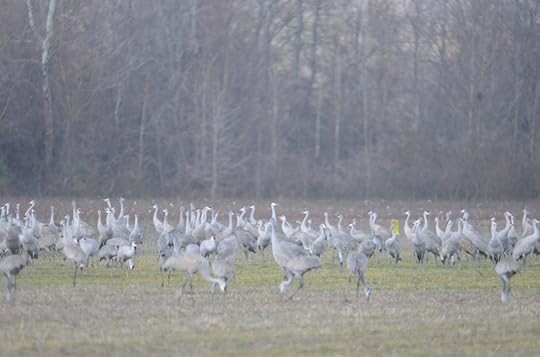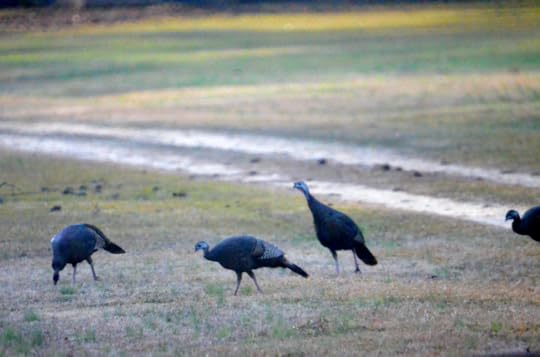R. Harrison's Blog, page 32
February 3, 2016
Aware #poem #lovepoem
D. H. Lawrence, 1885 – 1930
Slowly the moon is rising out of the ruddy haze,
Divesting herself of her golden shift, and so
Emerging white and exquisite; and I in amaze
See in the sky before me, a woman I did not know
I loved, but there she goes and her beauty hurts my heart;
I follow her down the night, begging her not to depart.


February 2, 2016
Dartmoor story XIII #amwriting #WIP
The start of the story can be found here.
Following from the last section
where Dr Standfast is listening to the music of the spheres. A new chapter where Elizabeth finds and cannot get into Dr Standfast’s laboratory.
It was Elizabeth’s turn to smile at her friend. “When I’m stronger, why don’t we arrange for an expedition to see the works? Just the pair of us, I have this deep desire to explore the ancient monuments. You have kindly offered to show me the nearest ones.”
“Deep desire?”
“New found, but intense. Though I think your parents don’t need to hear how new found it is.”
Morning the next day found Elizabeth at loose ends. Lucy had warned her before leaving the day before that she would be visiting households in the parish with her mother, an inescapable consequence of being a vicar’s daughter. Since her health precluded going with her friend, Elizabeth was left to wander around Barnecourt. The house, its gardens, and even the chickens paled. They could not hold a candle to the breeze of life in London. Not quite, completely, Elizabeth played with the barn kittens under the watchful but ever suspicious eyes of their mothers.
Mary interrupted her play, “Dinner is ready Miss. Wash yourself first.” Then she went in search of her husband and Dr Standfast.
With Elizabeth, her uncle Sylvester, and Mrs Trent seated around the table, Mr George Trent began his grace, “Let us pray, for what we are about to receive.” After what seemed forever to Elizabeth, since the country air and her recovering health had given her a serious appetite, he finally said, “Amen.”
Elizabeth started in on a plate filled with a Yorkshire pudding, gravy, roast potatoes and a slice from the joint. Then, fork in mid-air with her first bite, she asked, “What about Mr Sharpless?”
“That useless lump?” George said, “Set him to cleaning tack, polishing the brass on the saddles then cleaning the leather. What a mess. Should ha’ done it myself.”
“That’s not fair, George,” Sylvester said, “Once you showed him what to do, he did a sterling job.”
“When he wasn’t scared by the cows, or,” he laughed, “should have seen him jump when that cat rubbed against his ankle.”
“Would it be rude of me to take him a plate?” Elizabeth asked, “He seemed nice enough, poor lad.”
Sylvester said, “Your concern does you well, niece, but he has plenty to eat. So you needn’t worry.”
“Still to eat alone.”
George smirked, “The animals will do for company. Let him get used to them.”
Elizabeth was not convinced, but her dinner was waiting. It smelled excellent, was getting cold and she was starving.
After watching her clean her plate, and then ask for seconds, Sylvester commented, “It looks like the fresh air agrees with you, Elizabeth.”
“Either that or Mrs Trent’s cooking.”
After they finished the meal, and Elizabeth helped, over Mrs Trent’s objections, with clearing the dishes, Elizabeth skipped out to the barn. One of the kittens, an orange and white one she had played with in the morning mewed at her. She picked it up, and it purred while she stroked it, “I wonder if you have a name. You’re certainly friendly.”
The kitten continued to purr, so she said, “I guess you don’t. I shall call you Mimi.”
The kitten didn’t object so she carried it into the barn in search of the unfortunate Mr Sharpless. She found him sitting in the back, completely exhausted from shovelling the stalls. He rose and touched his forehead in a salute, “Miss James.”
“I wondered how you were. How is that ankle?”
“Still hurts, but this brace.” He held up his foot to show a metal brace that ran from his calf to a hinge and then along, around and below his foot. “This brace that your uncle made allows me to move around.”
“I can see. You’ve been busy.”
“Not busy enough for Mr Trent. I should be shovelling and raking these stalls. Would you believe they were cleaned last week? Who would have thought horses could emit so much so quickly.”
“They are big animals. It ought to be better than elephants.”
“Elephants?” Henry paused, momentarily puzzled, “Oh elephants, yes, they are smaller and easier than them.”
Elizabeth hesitated, then she said, “Would you like to stroke my kitten? I’m going to call her Mimi.”
Henry nodded and she handed Mimi to him. Mimi still purred, even in this stranger’s hands. “One thing, Miss James. I think he’s a Tom.”
“Oh dear. I shall need another name.”
“I might be wrong, ask Mr Trent.”
“Ask Mr Trent what, you skulking devil. Get tha’ back to cleaning the stalls, and don’t talk to the quality.”
Henry handed the kitten back to Elizabeth and picked up his shovel. “Sir.” Then he started in on shovelling out the next stall.
“Good. Now Miss James, what can I do for you?”
“I was just showing a kitten I liked to Mr Sharpless. That and seeing how he is recovering from his injuries.”
“Gormless lad, leave him to me, Miss James. Which kitten?”
“That orange and white one.” She pointed. “I’m calling her Mimi.”
“That little Tom?”
“How can you tell?”
“Don’t you know about that?” There was an edge of panic in his voice. Mr Trent did not look forward to explaining mammalian biology to a young woman, “I can get Mrs Trent to explain.”
Henry chuckled in the background. Mr Trent snapped at him, “Get thee back to work, tha’ lazy lump.”
“I know what you’re hinting at. I may come from the city, but I’m not daft. Just how can you tell with a kitten, so easily?”
Mr Trent gave a sigh of relief, “Look how he holds his tail. Struts about like he owns the place, and if you look closely.”
Elizabeth blushed, “I see. I shall need another name.”
“I don’t know, Miss, that cat’s know their names. Mimi, or ‘cat!’ are the same.”
“I think he’d appreciate a noble name.”
“Call him what you want, Miss James. I must get about my work. Henry! Get thee here.”
If you liked this you might like some of my other work. Sign up for my newsletter. You can also have a look at my author’s page.


February 1, 2016
Sandhill Cranes #birding
The Sandhill Cranes overwinter in northern Alabama near Weiss Lake. The flocks have been getting bigger as the word seems to be spreading among them. They concentrate on damp/flooded cotton and soybean fields where they can find various small creatures to eat.
While we were parked and taking photographs several flocks flew in to join the main one. They spread out in the morning and then gather together. The next few shots show the process.
They aren’t spooked by cars, so you can quietly pull off the road, turn off your engine and take pictures. These were with a relatively inexpensive 500mm mirror lens.


January 31, 2016
Wild Turkeys #birding
They’re back, they’re bold, and they’re native.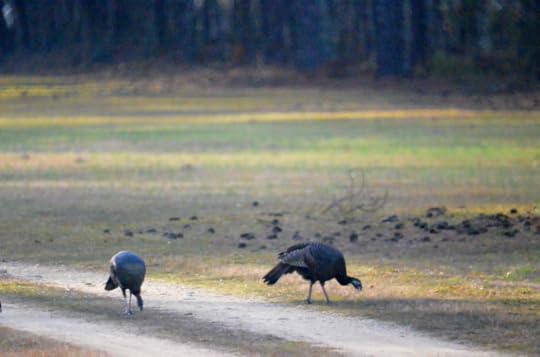
The turkeys are forming up into mixed flocks with several toms and a larger number of hens. In the next month they’ll partition into individual flocks with just one tom each. After the eggs hatch, we’ll see flocks of the chicks accompanying their father.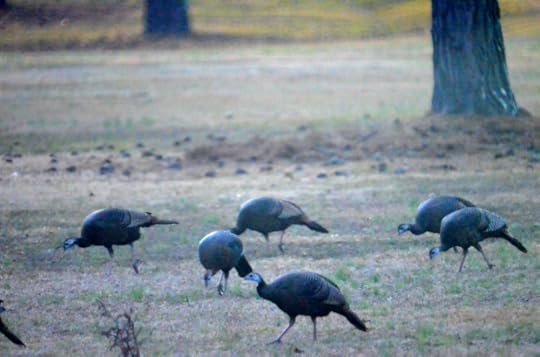


This Much and More
Djuna Barnes
If my lover were a comet
Hung in air,
I would braid my leaping body
In his hair.
Yea, if they buried him ten leagues
Beneath the loam,
My fingers they would learn to dig
And I’d plunge home!


January 30, 2016
At Last #poem
Christina Rossetti, 1830 – 1894
Many have sung of love a root of bane:
While to my mind a root of balm it is,
For love at length breeds love; sufficient bliss
For life and death and rising up again.
Surely when light of Heaven makes all things plain,
Love will grow plain with all its mysteries;
Nor shall we need to fetch from over seas
Wisdom or wealth or pleasure safe from pain.
Love in our borders, love within our heart,
Love all in all, we then shall bide at rest,
Ended for ever life’s unending quest,
Ended for ever effort, change and fear:
Love all in all; —no more that better part
Purchased, but at the cost of all things here.


FrankenKitty 16 #wewriwar #amwriting
(Some assembly required)

Welcome to Weekend Writing Warriors. This is a sample from my latest work “Frankenkitty”, and I hope you enjoy it. It started out as a young-adult superhero book, and well, you’ll see. In last week’s snippet, the gerbil awakens. He’s grown to the size of a guinea pig. After Amber’s mother has calmed down, she has some words for the gang. The snippet starts after she’s told them to stop.
“Good, there are some cookies in the kitchen. Why don’t you have some, and then do something wholesome, like play a computer game or watch some TV?”
When Jennifer’s mother picked her up before dinner, she carried the Gerbil in its cage.
“This is for Bobby.”
“It looks like a Gerbil, but it’s too big; What is it?”
“A special African Gerbil.”
“Is it safe?”
“I think so,” the creature snapped its jaws at Jennifer and gave what sounded like a high-pitched snarl.
“I hope so for your sake; you know who gets to clean the cage when Bobby forgets.”
This is no longer a work in progress.
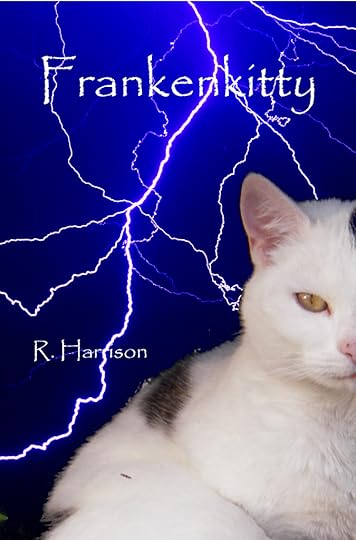
I’ve also released a sweet regency romance, Miss DeVere

My book “The Curious Profession of Dr. Craven” is finally out!
January 29, 2016
Simplified care of Cast Iron Cookware or a Few Myths Removed.
Myths about cast iron are some of the things I run into as a trainer of scout adult leaders. Which is a bit of a shame. If you understand the chemistry, then care is easy.
The basic chemistry can be summarized as follows
The black coating is Iron Oxide (Fe3 O4 and others).
Iron Oxide doesn’t react easily with water and sugar.
Iron Hydroxide (Rust, Fe(OH)3 and others) reacts easily with water and sugars
Iron Hydroxide can be converted with heat, a carbon source and a somewhat anaerobic environment, into iron oxide
I am being a bit simplistic here, but it’s accurate enough.
The recommended care cycle for cast iron then makes sense. After cooking, use water to clean the debris. Really stuck on crud can be removed with boiling water. After the pot is clean, coat it in oil and heat.
What’s going on?
You’re removing the debris, and then regenerating a layer of iron oxide. That simple.
Cool.
What happens when food sticks?
Sugar in the food reacts with trace amounts of iron hydroxide on the pan’s surface. But, you say, “Meat doesn’t have sugar in it and meat will stick?” The answer is that meat, at least from complex critters (Eucaryotes), is covered in sugars as part of how cells recognize and communicate with each other. Sugars contain alcohol groups (Not ethanol – you won’t get drunk from eating them) which interact with iron in much the same way as water. So you get an Iron-sugar chemical compound, which after pyrolysis (a fancy way to say burning) becomes a sticky mess.
So how do we stop the sticking?
Heat the pan first. This drives off much of the remaining water, converting the trace amounts of hydroxide back to oxide. A coat of oil also helps because it keeps the sugars in the food from contacting the metal surface.
Why shouldn’t I use soap?
Two reasons.
First, I will remove some of the protective oil and expose the more reactive iron to water. Thus generating hydroxides. I see this when I make a white gravy (Milk based) where the natural detergents in the milk strip some of the oil away. There’s usually a thin coating of the brown hydroxide after I’ve cleaned the pan. Coating the pan with oil and heating returns it to normal.
Second, the detergent mixes with the oil. You won’t necessarily taste it, but detergents have chemical groups that attract water and sugars. Therefore the detergent helps the food to stick.
Conclusion
Note that I haven’t given highly specific temperatures. Things like “sandblast and put in a 305 degree oven for exactly 45 minutes.” That’s because they are not necessary. Keep it dry, keep it oiled, and avoid detergents. Remember you’re trying to build up a layer of iron oxide and you’ll be fine. Not only that but your great-grandchildren will thank you when they use your pan.


January 28, 2016
Dartmoor story XII #amwriting #WIP
The start of the story can be found here.
Following from the last section
A strange man falls into Elizabeth’s life. This continues the chapter, with Dr Standfast up to something odd.
“I don’t. The last book I read was ‘Three men in a boat.” I doubt ‘Uncle Podger’ could give rise to dreams about much other than fat men running for the train or else smashing walls when hanging a picture. I did like Montemercy, could we have a dog?”
“Then Miss Grace.”
“She is a romantic soul, read me a poem by the river. It was lovely, and I’ll have to read some poetry myself.”
“Just don’t let your imagination get carried away, and no Fox-Terriers, at least not until you’re truly recovered.” He looked at the clock, “My, is that the time? An experiment awaits. On my way out I’ll see that Mary brings your supper.”
Elizabeth awoke with a start, it was the middle of the night. She turned over and tried to get some more sleep, but Morpheus while so plentiful with his gifts in the evening, had fled for greener pastures. There was no cure for it, but to rise and find something to read. She put her feet on the cold wooden floor and walked to the window. The moon was setting, but still gave enough light that she could see into the fields, just beyond the farmyard. Something strange, something strange and big, was moving out there. Something that required investigation.
She slipped into a robe and found her way downstairs. A pile of Wellington boots lay by the kitchen door and she found one pair that fit, more or less. Then she wandered outside to see what the thing was.
Once there she saw it. “Good gracious,” she cried, “this looks like nothing more than an enormous upside-down umbrella. Whatever is it?”
She jumped when her Uncle Sylvester answered, “It’s my ear.”
“Your ear? I didn’t know you were so hard of hearing. It’s enormous.”
“Let me explain, it’s for listening to the music of the spheres.”
“The music of the spheres?”
“I don’t know what else to call it. Here.” He led her underneath and put a telephone headpiece to her ear. “Listen.”
“All I hear is pops and crackling.”
“Quiet!” He turned the umbrella and as he did a low throbbing noise filled the headpiece. “Hear that?”
“I do. What is it?”
“That’s Jupiter.”
Suddenly the noise cut out. “What happened?”
“The whisker must have moved.”
“Whisker?”
“I have a small crystal of Galena and a fine wire barely scratching the surface. Following Hertz’s work. It detects waves in the ether. It only works at night, our sun is far too noisy. Very delicate and has to be just right.”
“Oh. Like me?”
“No. My dear niece, you’re tough. Still, I shall have to bring the detector down to fix it. If you’d like you can help me.”
Together they slowly lowered the device, folding it back up so that Sylvester could reach the detector. “It’s the dew, wetting it. I’m afraid we’re done listening for tonight.”
He stepped back and stared into the sky. The sun hadn’t yet risen, but the moon had finally set. The Milky Way, thousands of stars, shown brightly above them.
“Take a look Elizabeth. Isn’t it beautiful, breath-taking?”
“I’ve never seen it so bright.”
“Can’t see this through the fog and lights in London, can you?”
“No, and yes it is beautiful. Do you know the stars?”
“Many of them, especially the closer ones.”
Uncle Sylvester started to point out the summer constellations and give the stars their names when something slid across the sky. It didn’t blaze like a shooting star, but slowly glided across the sky above them, taking several minutes to cross from horizon to horizon.
“What’s that Uncle?”
“Trouble.” He stared at the sky for a few more moments and then added, “Now young lady, it’s time for you to get back into your bed.”
****
Elizabeth woke late the next morning. She rushed to the window, but no trace of the inverted umbrella was to be seen in the field. Was it a dream? Then she looked at the grass and saw that it was bent, compressed. There were tracks in the dew. She hadn’t dreamed it after all.
After throwing on a house-dress, taking her gazunder to the outhouse, and rinsing it clean under the pump, she was on her way in when she met Mary.
“You needn’t do that Miss.”
“I did it at home, and you’re busy enough, Mrs Trent.”
Mary took it from her and said, “Yes, Miss. There’s porridge on the stove and the tea, under the cosy, should still be warm. Get your breakfast.”
“Yes, Mrs Trent.” Elizabeth turned to enter the kitchen, then she stopped and added, “Mrs Trent, does my Uncle often scan the skies?”
“You saw him?”
“Last night.”
“He used to, near every night, but hasn’t for a long while. Think that Mr Sharpless’s arrival has started him up again.”
“How is he?”
“Mr Sharpless. Ah, Mr Trent says he’ll live. Don’t know that he’ll be much good. Soft hands, never done a day’s hard work in his life.”
“He said he’d shovelled up after the elephants in the circus.”
“Believe that and I have another for you. George said he was scared of the milk cows.”
“But they’re so sweet, almost pets. Mrs Trent, is there anything I can do to help you or Mr Trent around the farm? I’m not sure I’d be that skilful, but I’d like to.”
Mary smiled at her, “After you eat your breakfast, you can help me with the chickens, unless you want to help Mr Trent clean the stables.”
“Chickens.”
“I didn’t think you’d want to shovel out the stalls.” Mary chuckled.
“No, but I would like to learn more about the animals. Mother always had to stop me from petting the cart horses back home.”
“When you’re stronger. Remember what Dr Standfast said. You need to build up your strength. I’m sure it will come in time, but you’re not to exhaust yourself today. Now go get your tea before it’s cold.”
“Yes, Mrs Trent.”
After she finished a bowl of delicious and nourishing porridge, oats cooked with milk and sugar until they stuck to the spoon, the bowl, and her ribs, Mary escorted her to the chicken coop. There she was initiated in the ways of telling which hens were sitting on eggs, how much feed to scatter for them, and where to fill the water. After they let the chickens into their yard, Mary added, “We’ll need to lock them away this evening. Mr Hobbes said he’d seen a fox after meeting yesterday.”
This exciting task complete, Mary said, “Miss James, I must be about my work. Laundry day. The boiler should be hot by now.” Then she left Elizabeth in the farmyard.
Elizabeth watched her go, then turned and went into the barn. Or tried to. The closest barn was locked, locked with a Bramah lock, and short of cutting the bolt there was little she could do to open it. She thought, I suppose Uncle has his reasons, and moved on to the next section of the building. When this was locked as well, she hammered on the door.
“What is the matter?” Sylvester said from behind her.
Elizabeth jumped, “Why are the barns locked?”
“To keep the curious out and the contents safe. Miss Grace will be here shortly and you should change from that dowdy house-dress. Don’t want her to think you’re still ill, do you?”
“Lucy, here?”
“She said yesterday, she’d bring you something to read about mid-day, and I hear someone singing as they walk on the road from North Bovey. It doesn’t sound like George or one of the hands.”
Elizabeth, forgot about the barn, for the moment, and ran to the house to get changed into suitable clothes for entertaining her guest.
It was, indeed, Lucy and she brought several volumes of her favourite poetry with her. Mindful of Dr Standfast’s instructions to Elizabeth, they sat together in the front parlour, with tea and scones, having a quiet afternoon while they read together. They took turns reading aloud verses that they liked.
It was after Lucy finished one stanza that Elizabeth said, “Lucy, who’s Edward?”
“Edward! What, how?’
“There’s a letter tucked in this volume, from him.”
“You didn’t read it, did you?”
“Just the name.”
“Give it to me. Please.”
Elizabeth handed the letter to Lucy, who touched it to her lips and then tucked it into the volume she was reading.
“I guess he’s someone special. Your parents don’t approve?”
“No.” Lucy took a deep breath and explained, “We met when I was at school, and then at dances. He’s Reverend Baring-Gould’s oldest son. Promise me you won’t say anything.”
“I won’t. It’s exciting, you having a beau. I wish I did.”
Lucy blushed, “I’m sure you’ll find someone soon enough. I so wish my parents liked him.”
“Sounds as if he’s perfectly respectable, another clergyman’s child. What’s the problem?”
“My father thinks his father is too imaginative, spends too much time writing books.”
“I didn’t know that you could be too imaginative or write too many books.”
“I think they had a falling out over the Dartmoor Exploration Company.”
“What’s that? Wait, I remember, Uncle said that he’d built that pentacle for them. A Druidical monument.”
“Is that what he told you?”
“Yes, what did he tell your father?”
“That it was none of our business what was buried there. That and not to worry, it wasn’t devil worship.”
“But this Dartmoor Exploration Company. It is real?”
Lucy laughed, “Very much so. They’re excavating Neolithic and historical sites all over the moors. Edward is directing the excavations at Grimspound while he’s home from Cambridge.”
“Is that far away?”
“A couple miles, not far.”
It was Elizabeth’s turn to smile at her friend. “When I’m stronger, why don’t we arrange for an expedition to see the works? Just the pair of us, I have this deep desire to explore the ancient monuments. You have kindly offered to show me the nearest ones.”
“Deep desire?”
“New found, but intense. Though I think your parents don’t need to hear how new found it is.”
If you liked this you might like some of my other work. Sign up for my newsletter.


January 27, 2016
Bei Hennef
D. H. Lawrence, 1885 – 1930
The little river twittering in the twilight,
The wan, wondering look of the pale sky,
This is almost bliss.
And everything shut up and gone to sleep,
All the troubles and anxieties and pain
Gone under the twilight.
Only the twilight now, and the soft “Sh!” of the river
That will last forever.
And at last I know my love for you is here,
I can see it all, it is whole like the twilight,
It is large, so large, I could not see it before
Because of the little lights and flickers and interruptions,
Troubles, anxieties, and pains.
You are the call and I am the answer,
You are the wish, and I the fulfillment,
You are the night, and I the day.
What else—it is perfect enough,
It is perfectly complete,
You and I.
A creek in the Okefenokee NWR, miles from anywhere.



